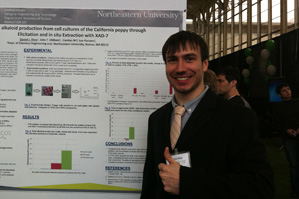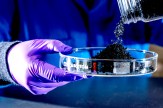Northeastern alum wins poster competition

When Dan Shea was an undergraduate at Northeastern’s College of Science, he spent much of his time hanging out with a plant. Or parts of a plant, anyway: Cell cultures from the California poppy. The plant produces a group of molecules called BPAs, not to be confused with the polymers plaguing water bottles and microwave dinners, but rather a class of anti-cancer drugs that also has anti-microbial properties. Shea was working to increase production of the compound using techniques developed in the lab of Carolyn Lee-Parsons, whom I wrote about last week.
He focused on two approaches. First, he tried to increase BPA production by infiltrating the cell culture system with hefty loads of purified yeast extract. The California poppy makes BPA to protect itself from pathogens, Shea told me, and this yeast attack mimics pathogen impact, setting off a spike in BPA production.
He also worked with an extracting agent (cleverly named XAD-7) to pull the BPA molecules out of the cells to overcome the negative feedback effect that naturally takes place. Normally, once BPA levels reach a certain point, the cell shuts down production. By removing the chemical, cells never get the message to stop working. This work allowed him to increase BPA production 65-fold, said Shea. “These results are encouraging, as increasing BPA production using cell culture can have real world applications in industry if production can be increased enough.”
Shea’s work, which he presented at a poster presentation in the spring, earned him an award from the International Society for Pharmaceutical Engineering.
He’s now enrolled in graduate school at Johns Hopkins University where he was recently accepted into a research lab that uses micro-fluidic channels to study cancer metastasis. “By adjusting the characteristics of the channels, one can mimic in vivo conditions providing a physiologically relevant environment for the study of cancer metastasis,” said Shea.






